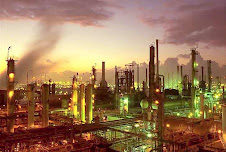It was a lousy Friday morning. I have barely slept in the last two nights. Acknowledging the missing usefulness of rolling around in my bed, I finally decided to get up at 4 am and do some surfing. Later I took a shower, got dressed, and got into the early morning taxi to the airport. after a quick check-in i stand somewhat displaced among all those grey business men at the gate, waiting to board the plane to frankfurt. i ask myself if I look the same to the the two small boys strolling around there. business accordingly i read the business paper and take a short coffee in the plane.
less then 2 hours later I have taken a seat in a luxurious office, lurking out of the window, overseeing the skyline of frankfurt. i sit next to two nervous applicants which do not know what to do with their hands and bodies. but in contrast to the two present partners, they still look healthy. the parters tell us about work-life-balance and flying business class.
so, that's what they live for. then the standard iq test. and another coffee break. why doesn't anyone eat? i take up my additional role as food conveyer. the real battle starts in the following interviews. they start pounding my brain with math puzzles and questions. everything okay. but then the cases emerge. two of the three interviewing partners come from the automotive practice. and my cases relate to their field.
and there they come with their wonderful cases: the german automotive sector is facing three scenarios of a carbon dioxide emissions tax or cap. three scenarios how the cap and tax will eventually look like. what are the implications? what are the costs? what does it mean to profit, sales, the entire product portfolio? what measures to take? So Mister, how would you proceed? I am delighted! This is my world, i am truly fascinated by this problem. So I try to structure, analyze, lay out, synthesize. A wonderful task, indeed. How to succedd in carbon-constrained economy.
But those guys are not interested in any solution, especially not to a questioning of their basic assumptions. To challenge me, they revert back to math problems to put the carbon question in a more "relevant" context. I have to calculate how much CO2 a human emits over a year through breathing. then the same for a car. 300 versus 2500 kg on average as results. the consultant is happy, we've put the whole thing in a new perspective. i tell him that the difference is 2500 kg in emissions (and not 2200 Kg). he is puzzled. anyway, he says, carbon dioxide is good for plant growth (no more arguments?!) so he let's me calculate the approximate wood growth volumes of swiss forests.
but eventually we battle back to the case. we look more closely at how costs are piling up for certain categories of cars, get to an average additional product cost which then has to be handed over to the customers, if possible. i ask if it is fair to assume that we take the average expected addititional product cost for all categories of cars, since the small cars already are below the cap... the consultants gets furious... this thing went on for almost three hours...
of course, we found a solution to the case. i even think that we agreed to disagree. fact is, this star-rated (how to heck did they get those stars?) international top management consultancy is not here to truly find new solutions but to work for the mighty automotive industry to do everything possible to not have to change the existing business model. they are losing. demand is breaking away (e.g. 11% of young tokyo urbanites still want to buy a car... nzz folio, 10/2007, p. 66). more nimble competitiors are carving away more and more of the market. entirely new mobility concepts are emerging (mobility.ch or V2G idea of transforming cars into electronical appliances and merging them as vast decentralized battery and backup / peak load power system with the conventional electricity grid) but instead of moving ahead they fight incredibly wasteful battles (seen from a resource perspective) to at least be able to somewhat go on...
should those losers be compensated for eventual losses stemming from this rearrangements in the industry. in order to loosen their resistance?
i am incredibly thankful for this day. seldomly i have learnt so much as regards the real challenges of enforcing caps and changes in the way we do business and conduct our life.
20 September, 2007
My Carbon Battle of the Year
Subscribe to:
Post Comments (Atom)

No comments:
Post a Comment